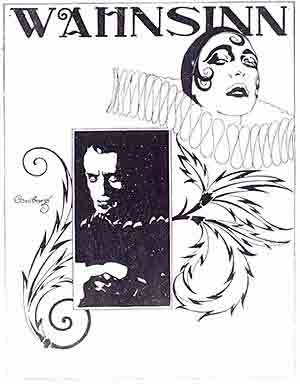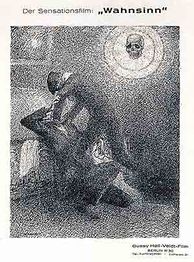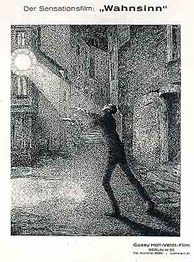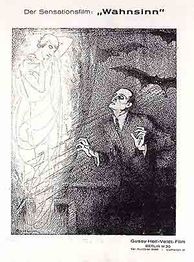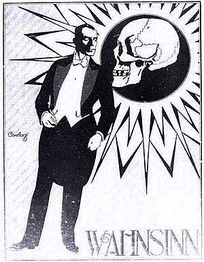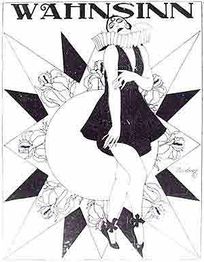Wahnsinn (lost German horror film; 1919)
Wahnsinn (meaning Madness in German) is a silent German horror film released on the 15th of October 1919, directed by and starring Conrad Veidt, serving as the actor's directorial debut.[1] It starred Veidt in the lead role, alongside Reinhold Schünzel, Grit Hegesa and Gussy Holl (Veidt's wife at the time).[2]
The film's screenplay was written by Hermann Fellner and Margarete Lindau-Schulz, and was adapted from a relatively unknown novel of the same name by Kurt Muenzer. The film's crew may have included Carl Hoffman as cinematographer and art direction by Willi Hermann (however this is unconfirmed). It likely had German intertitles throughout the film, similar to those seen in other films from the era such as The Cabinet of Dr Caligari, which Veidt also starred in.
The film was produced by Veidt's own short lived production company Veidtfilm, which produced the two films he directed in his lifetime, the other being the 1920 film Die Nacht auf Goldenhall (English: The Night at Goldenhall), which is also lost today. Neither of his two films did well at the box office, which may have been a factor in Veidt's decision to return exclusively to acting roles soon after.[3]
Synopsis
Note: The following is a loose translation of the original German production company's press release found in the First International Film Newspaper (Berlin) (vol. 13, no. 40 published on 11 Oct 1919 and found on p. 50-51).
Friedrich Lorenzen, an eccentric banker who avoids people, is close to madness when he learns that his lover Marion is having an affair with his general manager Jörges. He suffers from a nervous breakdown and on the advice of his doctor undertakes a trip around the world, so that other people and areas will bring him new ideas.
One day his travelling car bumps into Gypsies, and he is told: "A chest will bring you the highest earthly happiness, but also death. Find the chest!"
The command: “Find the chest!” becomes his obsession. He once again races through the country in the car. Everywhere he looks for the chest, often thinking he has found it. He sees the chest in visions, and beside it he sees a beautiful young girl standing next to it. He can’t find rest anywhere. He wanders around restlessly, constantly searching. Insanity! He roams the same alleys, houses and streets again, but everything has amounted to nothing.
On the way home, a young crier offers him things for sale, including an oddly shaped key. His face becomes rigid, as the key bears the features of that girl who keeps appearing in his visions. With magical force, he feels forced to buy the key.
When he returns home, his servants are busy arranging his things he had bought along the way, however nothing gives him any pleasure. Suddenly his gaze falls on a letter.
"I know you as an art-loving gentleman and, in addition to the things you bought, I am sending you a valuable item - a rare chest. Unfortunately the key has been lost."
The chest! He jumps up and asks the servants for the chest. The key fits. Stunned, he collapses only to realise that this is a life changing mystery. His mood now alternates between euphoric joy that the chest will open up and bring the greatest happiness to him and a deeply sad realisation that his hours are soon numbered.
(All of the above events of the film are widely agreed upon however there seems to be some dispute on how the film actually ends, with two possible narratives occurring after this point. It is entirely possible however that both of these narratives have a place in the film, though most sources tend to only mention one and not the other.)
Possible Conclusions: When he opens the chest, he recoils: the girl climbs out of the coffin like a ghostly apparition. She presses it to him, he wants to kiss her, when suddenly the grinning gypsy girl stares back in his face.He runs away, tormented by the most terrible horrors. The prophecy is fulfilled. He was still granted three nights - three blissful nights in which he was allowed to relive his whole life. His childishness, young love. Then the gloomy companion approaches death, not peacefully as it often comes -in a horrible embrace he pulls him towards him into the black nothingness. The faithless friend became the tool by whose hand he lost everything, love, happiness and life.
AND/OR
Now Marion (Lorenzen’s lover), forced into prostitution by Jörges, comes back to Lorenzen, but he no longer recognizes her in his madness. Jörges is on Marion's trail and locks Lorenzen in the chest. The lock snaps shut and can no longer be opened.[4]
Review
Note: This is a loose translations from the original German version of the review.
Anonymous:
"In the Marble House you meet Conrad Veidt in his star film "Wahnsinn", which shows his strong film-dramatic talents. Reinhold Schünzel and the classy dancer Grit Hegesa, who is sharply drawn in the film, give strong performances of their own. The charming Gussy Holl appears in a small role."[5]
Cast List
| Cast Member | Character Name |
|---|---|
| Conrad Veidt | Bankier Lorenzen |
| Reinhold Schünzel | Jörges |
| Grit Hegesa | Marion Cavello |
| Gussy Holl | Mädchen aus dem Althändler Laden |
| Heinrich Peer | Unknown Role |
Crew List
| Cast Member | Character Name |
|---|---|
| Director | Conrad Veidt |
| Writer(s) | Margarete Lindau-Schulz, Hermann Fellner, Kurt Muenzer (story) |
| Cinematography | Carl Hoffmann (or possibly Karl Freund) |
| Set Design/Art Direction | Willi Herrmann |
Gallery
Images
External Links
References
- ↑ A History of Horror book which mentions Wahnsinn. Retrieved 10 Jan '23
- ↑ Murnau by Lotte H. Eisner Page 130 Retrieved 10 Jan '23
- ↑ Conrad Veidt on Screen: A Comprehensive Illustrated Filmography page 103 Retrieved 11 Jan '23
- ↑ The film's synopsis. Retrieved 11 Jan '23
- ↑ German website containing various reviews on the film. Retrieved 11 Jan '23

